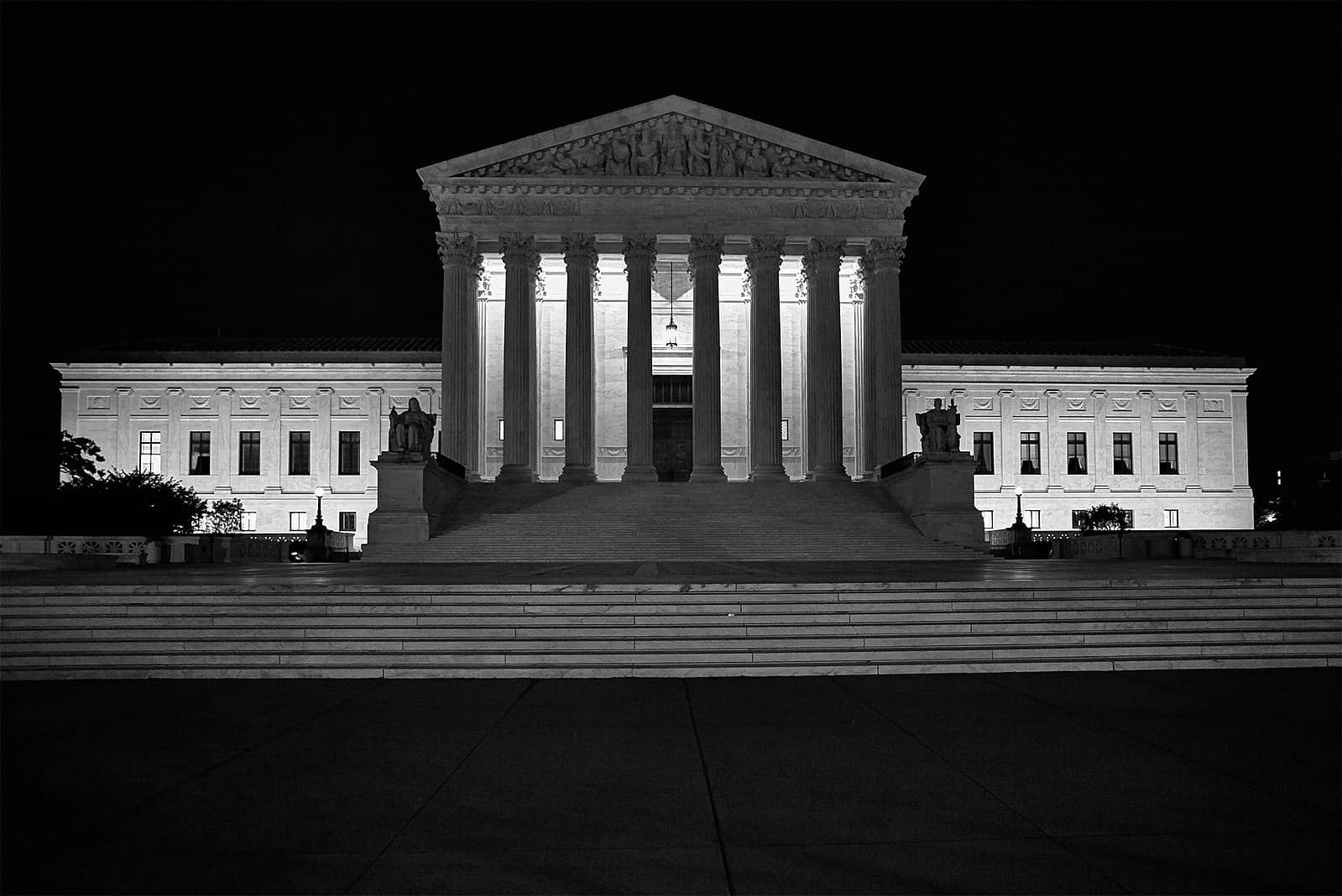
Tascha Shahriari-Parsa is a government lawyer enforcing workers’ rights laws. He clerked on the Supreme Court of California after graduating from Harvard Law School in 2024. His writing on this blog reflects his personal views only.
In today’s news and commentary: the Supreme Court granted cert in a case involving NLRA preemption of state tort claims; and the Ninth Circuit held oral arguments in a suit challenging an immigrant detention center’s practice of paying $1/day to detainees for their labor.
This week, the Supreme Court granted cert in a case involving NLRA preemption of state tort claims. Back in 2017, truck drivers with Teamsters Local 127 at Glacier, a Washington corporation that sells and delivers custom-made concrete, went on strike. This “resulted in a loss of some of Glacier’s concrete.” According to Glacier’s allegations, Local 174 “had coordinated with truck drivers to purposely time the strike when concrete was being batched and delivered in order to cause destruction of the concrete,” which “drivers and Local 174 were fully aware … was perishable.” Under the NLRA, there may be a question of whether the union’s work stoppage was an unfair labor practice; but this case raises a separate question, of whether the employer can bring a tort claim under state law against the union for the destruction of its property. Under years of precedent, the answer to this question seems quite clearly to be no. But the Supreme Court’s grant of certiorari suggests that it may be considering including NLRA pre-emption of state law tort claims in its package of big reversals for the next term. If it does limit NLRA pre-emption, tort claims brought against unions under state law could contribute to the depletion of unions’ valuable resources and create a tremendous chilling effect on labor activity, including activity protected by the NLRA. And it would transfer the adjudication of labor disputes from “the exclusive competence of the National Labor Relations Board” to the courts, which the Supreme Court itself has acknowledged is an ill-suited institution for the resolution of daily labor disputes.
In prior cases, like San Diego Building Trades Council v. Garmon, the Supreme Court has held that the NLRA pre-empts state tort law claims “[w]hen an activity is arguably subject to [section] 7 or [section] 8 of the Act.” At issue in Garmon was an employer’s state tort law claim for losses in business caused by a union picket. Garmon thus held that because the union’s picket was at least arguably a prohibited unfair labor practice under the NLRA, the state law claim was pre-empted, and the dispute would instead have to be resolved exclusively by the NLRB under its jurisdiction. But Garmon also provided two exceptions to NLRA pre-emption: (1) where “the activity regulated was a merely peripheral concern of the Labor Management Relations Act” and (2) “where the regulated conduct touches interests so deeply rooted in local feeling and responsibility that, in the absence of compelling congressional direction, we could not infer that Congress had deprived the States of the power to act.” The second exception is primarily a question of whether the conduct at issue involves a certain kind of “violence or danger that undermines public order.” The general question in Glacier was whether the work stoppage, and the resulting loss in concrete, counts under that second question.
The Supreme Court of Washington concluded that the NLRA preempted Glacier’s claims. “[T]he incidental destruction of products during a strike, as opposed to property damage for its own sake, has not been sufficient to invoke the ‘local feeling’ exception in any United States Supreme Court case,” the court held. “If viewed as product damage incidental to the strike, the drivers’ conduct is closely tethered to the exercise of their section 7 rights and, at the same time, is attenuated from the State’s general interest in regulating violent conduct, such as vandalism, which is the core concern of the ‘local feeling’ exception.”
As Sharon Block commented earlier this week, the Court’s grant of cert in what should be an ordinary case of NLRA pre-emption is “hugely troubling”: “We have a federal agency that is supposed to figure out these kinds of cases. They have been doing it for decades . . . This has the potential to fundamentally alter how the [NLRA] operates. And that doesn’t belong in state court.” Union lawyer Benjamin Dictor also argued that “[a] ruling that effectively disarms one party of their economic leverage while leaving the other’s intact would necessarily destroy the relative balance of power that the [law] was intended to maintain.” In theory, the court could limit NLRA pre-emption in a way that also makes it easier for state and local governments to pass labor laws stronger than the NLRA. But given this court’s history, we may have reason to be skeptical of such a balanced determination: as Block noted, “[t]he real issue is whether this Supreme Court has the ability to be fair in cases involving unions.”
The case is Glacier Northwest, Inc. v. International Brotherhood of Teamsters, No. 21-1449.
In another case coming out of Washington state, the 9th Circuit held oral arguments yesterday in a case concerning private prison operator GEO Group’s payment of $1 daily wages to immigrant detainees in Tacoma, Washington. A U.S. District Court decided in October of last year that Washington law required GEO Group to give detainees a minimum wage, ordering the company to give three years of back pay totaling $17.3 million to current and former detainees. GEO Group appealed the case, contending in oral argument that the Washington Supreme Court previously held that what counts as an “employee” under the Washington Minimum Wage Act is the same as what counts as an “employee” under the federal Federal Labor Standards Act. And the Fourth Circuit held in Ndambi v. CoreCivic, Inc. that, under the FLSA, detainee workers were not in an “employer-employee” relationship but rather in a “detainer-detainee” one, and thus not entitled to the federal minimum wage. The case involves various questions of preemption, immunity, and constitutional avoidance, and the judges on the Ninth Circuit suggested, to the dismay of both sides of the litigation, that some of the questions might need to be certified to the Washington Supreme Court for determination.
While the lawsuits have been in the process of appeal, GEO Group decided to suspend its $1/hour work program instead of paying workers the minimum wage. This led to complaints by detainees that the facility “got really gross — nobody cleaned anything … nobody sweeps or mops” or cleans the toilets. Detainees also say that the pulling away of the $1/hour wage, as meager as it was, has prevented detainees from being able to afford buying food to supplement what many have described as inadequate meals provided by the detention center.
Something that may also be worth noting, which has been lost in some discussions of these cases, is that many, if not most, of the detainees in these facilities lack work authorization. Thus, classifying them as employees in order to compel payment of the minimum wage may result in the loss of any wage at all for the majority of these workers. For those concerned with the conditions of immigrant detainees, including detainees without work authorization, this fact raises the question of whether such litigation has a net-positive or negative effect for the welfare of detainees, and whether a better strategy might be calling for legislative or executive action to require federally contracted immigrant detention centers to pay detainees the minimum wage, to provide a system of temporary work authorization to immigrant detainees, and to improve the conditions and offerings in such facilities such that detainees are not forced to “voluntarily” work in order to have enough food, personal hygiene products, and other basic necessities — or, better yet, the end of immigrant detention altogether. Though, perhaps there are other compelling state interests in classifying detainees as employees despite the potential consequence of leaving many of them without work and thus worse off than they otherwise would have been. Either way, for detainees, it’s a choice between being hit in the head by a stick or by a hammer.
The case is Ugochukwu Nwauzor v. The GEO Group, Inc., pending before the Ninth Circuit. The oral argument begins at 38:00.






Daily News & Commentary
Start your day with our roundup of the latest labor developments. See all
January 13
15,000 New York City nurses go on strike; First Circuit rules against ferry employees challenging a COVID-19 vaccine mandate; New York lawmakers propose amendments to Trapped at Work Act.
January 12
Changes to EEOC voting procedures; workers tell SCOTUS to pass on collective action cases; Mamdani's plans for NYC wages.
January 11
Colorado unions revive push for pro-organizing bill, December’s jobs report shows an economic slowdown, and the NLRB begins handing down new decisions
January 9
TPS cancellation litigation updates; NFL appeals Second Circuit decision to SCOTUS; EEOC wins retaliation claim; Mamdani taps seasoned worker advocates to join him.
January 8
Pittsburg Post-Gazette announces closure in response to labor dispute, Texas AFT sues the state on First Amendment grounds, Baltimore approves its first project labor agreement, and the Board formally regains a quorum.
January 7
Wilcox requests en banc review at DC Circuit; 9th Circuit rules that ministry can consider sexual orientation in hiring decisions